- Home
- Henry James
The Marriages
The Marriages Read online
The Marriages
Henry James
This etext was scanned by David Price, email [email protected] from the 1922 Macmillan and Co. edition. Proofed by Elizabeth Manzelli and Vanessa Mosher.
The Marriages
by Henry James
CHAPTER I
“Won’t you stay a little longer?” the hostess asked while she held the girl’s hand and smiled. “It’s too early for every one to go— it’s too absurd.” Mrs. Churchley inclined her head to one side and looked gracious; she flourished about her face, in a vaguely protecting sheltering way, an enormous fan of red feathers. Everything in her composition, for Adela Chart, was enormous. She had big eyes, big teeth, big shoulders, big hands, big rings and bracelets, big jewels of every sort and many of them. The train of her crimson dress was longer than any other; her house was huge; her drawing-room, especially now that the company had left it, looked vast, and it offered to the girl’s eyes a collection of the largest sofas and chairs, pictures, mirrors, clocks, that she had ever beheld. Was Mrs. Churchley’s fortune also large, to account for so many immensities? Of this Adela could know nothing, but it struck her, while she smiled sweetly back at their entertainer, that she had better try to find out. Mrs. Churchley had at least a high-hung carriage drawn by the tallest horses, and in the Row she was to be seen perched on a mighty hunter. She was high and extensive herself, though not exactly fat; her bones were big, her limbs were long, and her loud hurrying voice resembled the bell of a steamboat. While she spoke to his daughter she had the air of hiding from Colonel Chart, a little shyly, behind the wide ostrich fan. But Colonel Chart was not a man to be either ignored or eluded.
“Of course every one’s going on to something else,” he said. “I believe there are a lot of things to-night.”
“And where are YOU going?” Mrs. Churchley asked, dropping her fan and turning her bright hard eyes on the Colonel.
“Oh I don’t do that sort of thing!”—he used a tone of familiar resentment that fell with a certain effect on his daughter’s ear. She saw in it that he thought Mrs. Churchley might have done him a little more justice. But what made the honest soul suppose her a person to look to for a perception of fine shades? Indeed the shade was one it might have been a little difficult to seize—the difference between “going on” and coming to a dinner of twenty people. The pair were in mourning; the second year had maintained it for Adela, but the Colonel hadn’t objected to dining with Mrs. Churchley, any more than he had objected at Easter to going down to the Millwards’, where he had met her and where the girl had her reasons for believing him to have known he should meet her. Adela wasn’t clear about the occasion of their original meeting, to which a certain mystery attached. In Mrs. Churchley’s exclamation now there was the fullest concurrence in Colonel Chart’s idea; she didn’t say “Ah yes, dear friend, I understand!” but this was the note of sympathy she plainly wished to sound. It immediately made Adela say to her “Surely you must be going on somewhere yourself.”
“Yes, you must have a lot of places,” the Colonel concurred, while his view of her shining raiment had an invidious directness. Adela could read the tacit implication: “You’re not in sorrow, in desolation.”
Mrs. Churchley turned away from her at this and just waited before answering. The red fan was up again, and this time it sheltered her from Adela. “I’ll give everything up—for YOU,” were the words that issued from behind it. “DO stay a little. I always think this is such a nice hour. One can really talk,” Mrs. Churchley went on. The Colonel laughed; he said it wasn’t fair. But their hostess pressed his daughter. “Do sit down; it’s the only time to have any talk.” The girl saw her father sit down, but she wandered away, turning her back and pretending to look at a picture. She was so far from agreeing with Mrs. Churchley that it was an hour she particularly disliked. She was conscious of the queerness, the shyness, in London, of the gregarious flight of guests after a dinner, the general sauve qui peut and panic fear of being left with the host and hostess. But personally she always felt the contagion, always conformed to the rush. Besides, she knew herself turn red now, flushed with a conviction that had come over her and that she wished not to show.
Her father sat down on one of the big sofas with Mrs. Churchley; fortunately he was also a person with a presence that could hold its own. Adela didn’t care to sit and watch them while they made love, as she crudely imaged it, and she cared still less to join in their strange commerce. She wandered further away, went into another of the bright “handsome,” rather nude rooms—they were like women dressed for a ball—where the displaced chairs, at awkward angles to each other, seemed to retain the attitudes of bored talkers. Her heart beat as she had seldom known it, but she continued to make a pretence of looking at the pictures on the walls and the ornaments on the tables, while she hoped that, as she preferred it, it would be also the course her father would like best. She hoped “awfully,” as she would have said, that he wouldn’t think her rude. She was a person of courage, and he was a kind, an intensely good-natured man; nevertheless she went in some fear of him. At home it had always been a religion with them to be nice to the people he liked. How, in the old days, her mother, her incomparable mother, so clever, so unerring, so perfect, how in the precious days her mother had practised that art! Oh her mother, her irrecoverable mother! One of the pictures she was looking at swam before her eyes. Mrs. Churchley, in the natural course, would have begun immediately to climb staircases. Adela could see the high bony shoulders and the long crimson tail and the universal coruscating nod wriggle their horribly practical way through the rest of the night. Therefore she MUST have had her reasons for detaining them. There were mothers who thought every one wanted to marry their eldest son, and the girl sought to be clear as to whether she herself belonged to the class of daughters who thought every one wanted to marry their father. Her companions left her alone; and though she didn’t want to be near them it angered her that Mrs. Churchley didn’t call her. That proved she was conscious of the situation. She would have called her, only Colonel Chart had perhaps dreadfully murmured “Don’t, love, don’t.” This proved he also was conscious. The time was really not long—ten minutes at the most elapsed—when he cried out gaily, pleasantly, as if with a small jocular reproach, “I say, Adela, we must release this dear lady!” He spoke of course as if it had been Adela’s fault that they lingered. When they took leave she gave Mrs. Churchley, without intention and without defiance, but from the simple sincerity of her pain, a longer look into the eyes than she had ever given her before. Mrs. Churchley’s onyx pupils reflected the question as distant dark windows reflect the sunset; they seemed to say: “Yes, I AM, if that’s what you want to know!”
What made the case worse, what made the girl more sure, was the silence preserved by her companion in the brougham on their way home. They rolled along in the June darkness from Prince’s Gate to Seymour Street, each looking out of a window in conscious prudence; watching but not seeing the hurry of the London night, the flash of lamps, the quick roll on the wood of hansoms and other broughams. Adela had expected her father would say something about Mrs. Churchley; but when he said nothing it affected her, very oddly, still more as if he had spoken. In Seymour Street he asked the footman if Mr. Godfrey had come in, to which the servant replied that he had come in early and gone straight to his room. Adela had gathered as much, without saying so, from a lighted window on the second floor; but she contributed no remark to the question. At the foot of the stairs her father halted as if he had something on his mind; but what it amounted to seemed only the dry “Good-night” with which he presently ascended. It was the first time since her mother’s death that he had bidden her good-night without kissing her. They were a kissing family, and after
that dire event the habit had taken a fresh spring. She had left behind her such a general passion of regret that in kissing each other they felt themselves a little to be kissing her. Now, as, standing in the hall, with the stiff watching footman—she could have said to him angrily “Go away!”—planted near her, she looked with unspeakable pain at her father’s back while he mounted, the effect was of his having withheld from another and a still more slighted cheek the touch of his lips.
He was going to his room, and after a moment she heard his door close. Then she said to the servant “Shut up the house”—she tried to do everything her mother had done, to be a little of what she had been, conscious only of falling woefully short—and took her own way upstairs. After she had reached her room she waited, listening, shaken by the apprehension that she should hear her father come out again and go up to Godfrey. He would go up to tell him, to have it over without delay, precisely because it would be so difficult. She asked herself indeed why he should tell Godfrey when he hadn’t taken the occasion—their drive home being an occasion—to tell herself. However, she wanted no announcing, no telling; there was such a horrible clearness in her mind that what she now waited for was only to be sure her father wouldn’t proceed as she had imagined. At the end of the minutes she saw this particular danger was over, upon which she came out and made her own way to her brother. Exactly what she wanted to say to him first, if their parent counted on the boy’s greater indulgence, and before he could say anything, was: “Don’t forgive him; don’t, don’t!”
He was to go up for an examination, poor lad, and during these weeks his lamp burned till the small hours. It was for the Foreign Office, and there was to be some frightful number of competitors; but Adela had great hopes of him—she believed so in his talents and saw with pity how hard he worked. This would have made her spare him, not trouble his night, his scanty rest, if anything less dreadful had been at stake. It was a blessing however that one could count on his coolness, young as he was—his bright good-looking discretion, the thing that already made him half a man of the world. Moreover he was the one who would care most. If Basil was the eldest son—he had as a matter of course gone into the army and was in India, on the staff, by good luck, of a governor-general—it was exactly this that would make him comparatively indifferent. His life was elsewhere, and his father and he had been in a measure military comrades, so that he would be deterred by a certain delicacy from protesting; he wouldn’t have liked any such protest in an affair of HIS. Beatrice and Muriel would care, but they were too young to speak, and this was just why her own responsibility was so great.
Godfrey was in working-gear—shirt and trousers and slippers and a beautiful silk jacket. His room felt hot, though a window was open to the summer night; the lamp on the table shed its studious light over a formidable heap of text-books and papers, the bed moreover showing how he had flung himself down to think out a problem. As soon as she got in she began. “Father’s going to marry Mrs. Churchley, you know.”
She saw his poor pink face turn pale. “How do you know?”
“I’ve seen with my eyes. We’ve been dining there—we’ve just come home. He’s in love with her. She’s in love with HIM. They’ll arrange it.”
“Oh I say!” Godfrey exclaimed, incredulous.
“He will, he will, he will!” cried the girl; and with it she burst into tears.
Godfrey, who had a cigarette in his hand, lighted it at one of the candles on the mantelpiece as if he were embarrassed. As Adela, who had dropped into his armchair, continued to sob, he said after a moment: “He oughtn’t to—he oughtn’t to.”
“Oh think of mamma—think of mamma!” she wailed almost louder than was safe.
“Yes, he ought to think of mamma.” With which Godfrey looked at the tip of his cigarette.
“To such a woman as that—after HER!”
“Dear old mamma!” said Godfrey while he smoked.
Adela rose again, drying her eyes. “It’s like an insult to her; it’s as if he denied her.” Now that she spoke of it she felt herself rise to a height. “He rubs out at a stroke all the years of their happiness.”
“They were awfully happy,” Godfrey agreed.
“Think what she was—think how no one else will ever again be like her!” the girl went on.
“I suppose he’s not very happy now,” her brother vaguely contributed.
“Of course he isn’t, any more than you and I are; and it’s dreadful of him to want to be.”
“Well, don’t make yourself miserable till you’re sure,” the young man said.
But Adela showed him confidently that she WAS sure, from the way the pair had behaved together and from her father’s attitude on the drive home. If Godfrey had been there he would have seen everything; it couldn’t be explained, but he would have felt. When he asked at what moment the girl had first had her suspicion she replied that it had all come at once, that evening; or that at least she had had no conscious fear till then. There had been signs for two or three weeks, but she hadn’t understood them—ever since the day Mrs. Churchley had dined in Seymour Street. Adela had on that occasion thought it odd her father should have wished to invite her, given the quiet way they were living; she was a person they knew so little. He had said something about her having been very civil to him, and that evening, already, she had guessed that he must have frequented their portentous guest herself more than there had been signs of. To-night it had come to her clearly that he would have called on her every day since the time of her dining with them; every afternoon about the hour he was ostensibly at his club. Mrs. Churchley WAS his club—she was for all the world just like one. At this Godfrey laughed; he wanted to know what his sister knew about clubs. She was slightly disappointed in his laugh, even wounded by it, but she knew perfectly what she meant: she meant that Mrs. Churchley was public and florid, promiscuous and mannish.
“Oh I daresay she’s all right,” he said as if he wanted to get on with his work. He looked at the clock on the mantel-shelf; he would have to put in another hour.
“All right to come and take darling mamma’s place—to sit where SHE used to sit, to lay her horrible hands on HER things?” Adela was appalled—all the more that she hadn’t expected it—at her brother’s apparent acceptance of such a prospect.
He coloured; there was something in her passionate piety that scorched him. She glared at him with tragic eyes—he might have profaned an altar. “Oh I mean that nothing will come of it.”
“Not if we do our duty,” said Adela. And then as he looked as if he hadn’t an idea of what that could be: “You must speak to him—tell him how we feel; that we shall never forgive him, that we can’t endure it.”
“He’ll think I’m cheeky,” her brother returned, looking down at his papers with his back to her and his hands in his pockets.
“Cheeky to plead for HER memory?”
“He’ll say it’s none of my business.”
“Then you believe he’ll do it?” cried the girl.
“Not a bit. Go to bed!”
“I’LL speak to him”—she had turned as pale as a young priestess.
“Don’t cry out till you’re hurt; wait till he speaks to YOU.”
“He won’t, he won’t!” she declared. “He’ll do it without telling us.”
Her brother had faced round to her again; he started a little at this, and again, at one of the candles, lighted his cigarette, which had gone out. She looked at him a moment; then he said something that surprised her. “Is Mrs. Churchley very rich?”
“I haven’t the least idea. What on earth has that to do with it?”
Godfrey puffed his cigarette. “Does she live as if she were?”
“She has a lot of hideous showy things.”
“Well, we must keep our eyes open,” he concluded. “And now you must let me get on.” He kissed his visitor as if to make up for dismissing her, or for his failure to take fire; and she held him a moment, burying her head on his shoulder.
>
A wave of emotion surged through her, and again she quavered out: “Ah why did she leave us? Why did she leave us?”
“Yes, why indeed?” the young man sighed, disengaging himself with a movement of oppression.
CHAPTER II
Adela was so far right as that by the end of the week, though she remained certain, her father had still not made the announcement she dreaded. What convinced her was the sense of her changed relations with him—of there being between them something unexpressed, something she was aware of as she would have been of an open wound. When she spoke of this to Godfrey he said the change was of her own making—also that she was cruelly unjust to the governor. She suffered even more from her brother’s unexpected perversity; she had had so different a theory about him that her disappointment was almost an humiliation and she needed all her fortitude to pitch her faith lower. She wondered what had happened to him and why he so failed her. She would have trusted him to feel right about anything, above all about such a question. Their worship of their mother’s memory, their recognition of her sacred place in their past, her exquisite influence in their father’s life, his fortune, his career, in the whole history of the family and welfare of the house— accomplished clever gentle good beautiful and capable as she had been, a woman whose quiet distinction was universally admired, so that on her death one of the Princesses, the most august of her friends, had written Adela such a note about her as princesses were understood very seldom to write: their hushed tenderness over all this was like a religion, and was also an attributive honour, to fall away from which was a form of treachery. This wasn’t the way people usually felt in London, she knew; but strenuous ardent observant girl as she was, with secrecies of sentiment and dim originalities of attitude, she had already made up her mind that London was no treasure-house of delicacies. Remembrance there was hammered thin— to be faithful was to make society gape. The patient dead were sacrificed; they had no shrines, for people were literally ashamed of mourning. When they had hustled all sensibility out of their lives they invented the fiction that they felt too much to utter. Adela said nothing to her sisters; this reticence was part of the virtue it was her idea to practise for them. SHE was to be their mother, a direct deputy and representative. Before the vision of that other woman parading in such a character she felt capable of ingenuities, of deep diplomacies. The essence of these indeed was just tremulously to watch her father. Five days after they had dined together at Mrs. Churchley’s he asked her if she had been to see that lady.

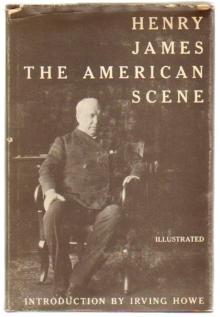 The American
The American The Wings of the Dove, Volume 1 of 2
The Wings of the Dove, Volume 1 of 2 Frost at Midnight
Frost at Midnight Morning Frost
Morning Frost The Portrait of a Lady — Volume 1
The Portrait of a Lady — Volume 1 Fatal Frost
Fatal Frost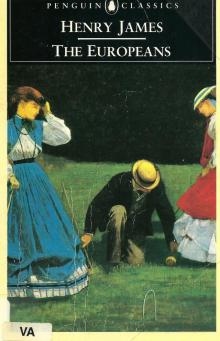 The Europeans
The Europeans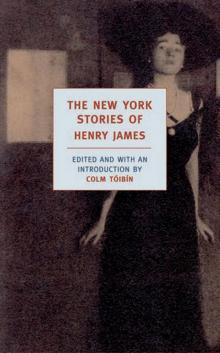 The New York Stories of Henry James
The New York Stories of Henry James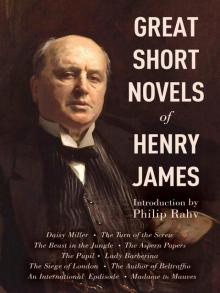 Great Short Novels of Henry James
Great Short Novels of Henry James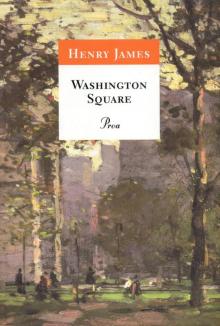 Washington Square
Washington Square The Portrait of a Lady — Volume 2
The Portrait of a Lady — Volume 2 The Ambassadors
The Ambassadors The Wings of the Dove
The Wings of the Dove The Princess Casamassima (Classics)
The Princess Casamassima (Classics) The Coxon Fund
The Coxon Fund First Frost
First Frost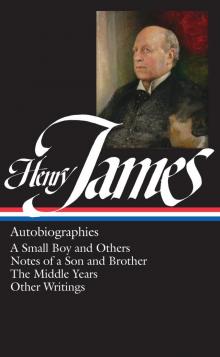 Henry James
Henry James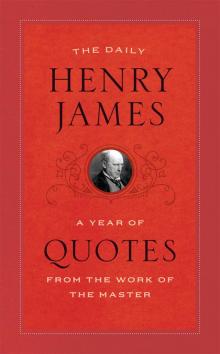 The Daily Henry James
The Daily Henry James Travels With Henry James
Travels With Henry James The Reverberator: A Novel
The Reverberator: A Novel What Maisie Knew (Henry James Collection)
What Maisie Knew (Henry James Collection)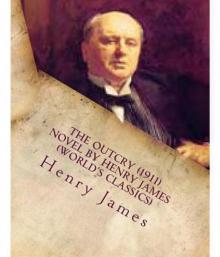 The Outcry
The Outcry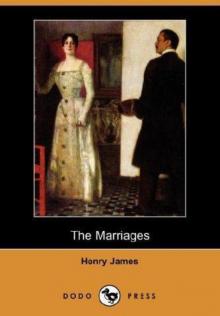 The Marriages
The Marriages The Wings of the Dove, Volume 2
The Wings of the Dove, Volume 2 The Bostonians, Vol. I
The Bostonians, Vol. I The Outcry: -1911
The Outcry: -1911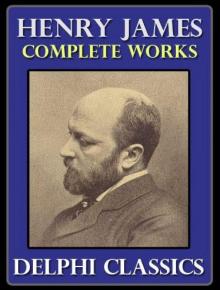 The Complete Works of Henry James
The Complete Works of Henry James Letters from the Palazzo Barbaro
Letters from the Palazzo Barbaro The Pupil
The Pupil The Bostonians, Vol. II
The Bostonians, Vol. II Pandora
Pandora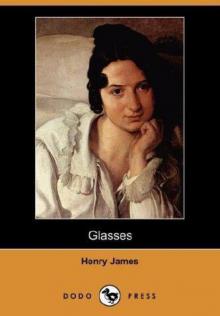 Glasses
Glasses The Princess Casamassima
The Princess Casamassima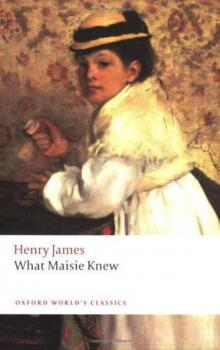 What Maisie Knew
What Maisie Knew The Reverberator
The Reverberator The Golden Bowl - Complete
The Golden Bowl - Complete Confidence
Confidence Wings of the Dove (Barnes & Noble Classics Series)
Wings of the Dove (Barnes & Noble Classics Series) The Spoils of Poynton
The Spoils of Poynton